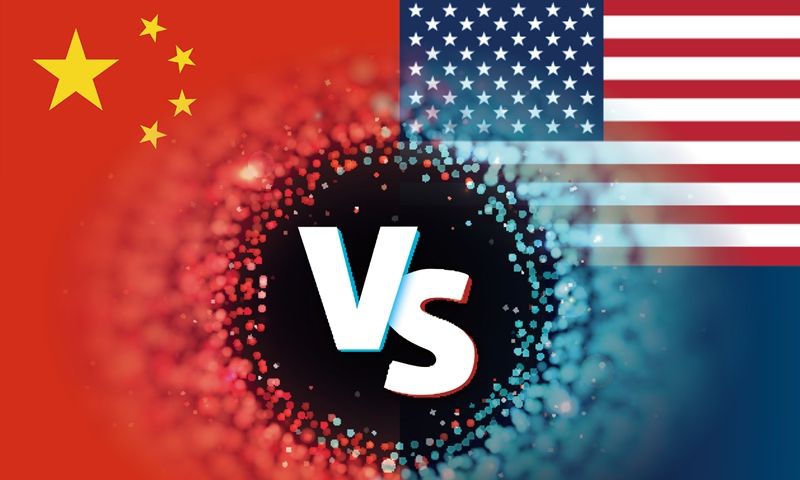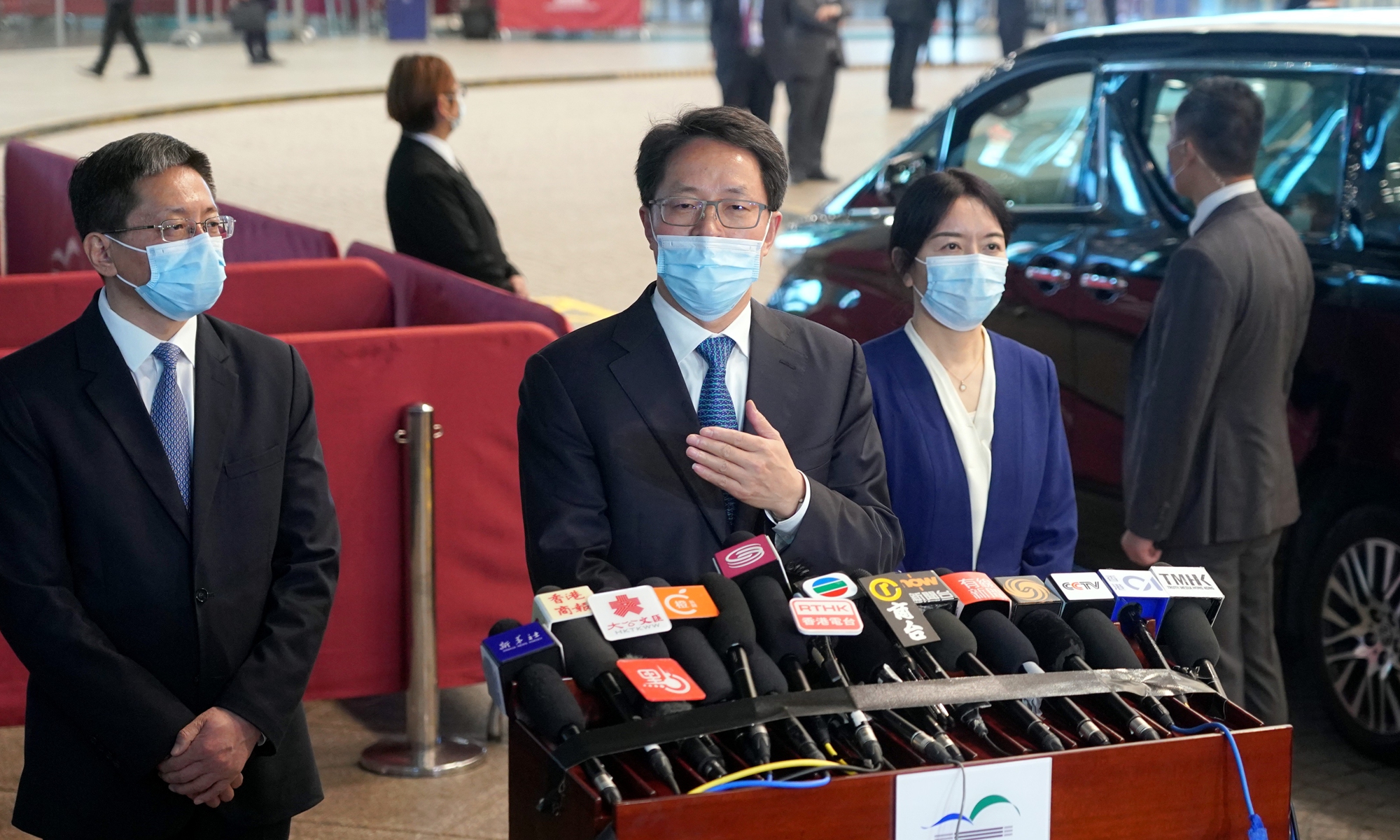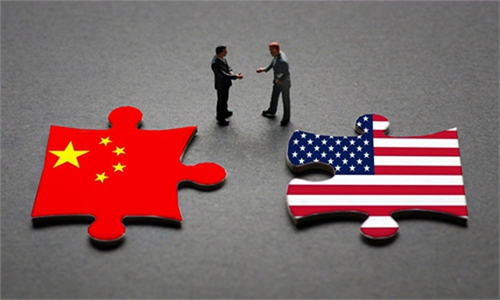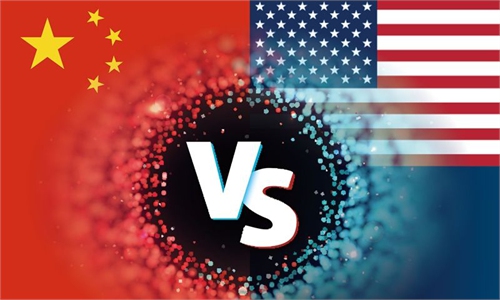China shrugs off US sanctions over HK, set to insist on core stances in Alaska
Attending meeting shows ‘Beijing’s maturity, confidence and patience’

China US Photo:GT
As the world is turning its eyes to a critical high-level meeting between senior Chinese and US officials, the US picked up a signature Trump-era strategy of wielding the stick ahead of talks by issuing on Wednesday sanctions against two dozen Chinese mainland and Hong Kong officials, including 14 vice chairmen of the Standing Committee of China's top legislature, one day ahead of the meeting in Alaska.
The move will not shake China's firm stance on its core interest of Hong Kong but will only undermine US sincerity and dim any hope of a reset in the near-frozen bilateral ties, analysts said.
Chinese experts said that the act just proves that the Biden administration has inherited the confrontational stance of the previous Trump administration, so there are probably no grounds for optimism ahead of the upcoming meeting. It should be considered an opportunity to exchange stances with each other, and let US officials understand how serious China is on core interests.
The latest sign from Chinese officials on Wednesday showed that China remains committed to holding candid conversations with the US during the first high-level dialogue since President Joe Biden took office, despite what Chinese officials previously characterized as an "evil path" pursued by the US in its China strategy.
Many Chinese observers and scholars suggested that China should just turn down the US invitation, but the Chinese foreign ministry said China will still attend, which experts said shows China's maturity, confidence and patience in dealing with the US.
US Secretary of State Antony Blinken announced the new sanctions on officials from the Chinese mainland and the Hong Kong Special Administrative Region (HKSAR) over the Hong Kong electoral reform.
Blinken said the US identified "24 officials, whose actions have reduced Hong Kong's high degree of autonomy, including 14 vice chairs of the National People's Congress (NPC) Standing Committee and officials in the Hong Kong Police Force's National Security Division, the Hong Kong and Macao Affairs Office, and the Office for Safeguarding National Security. Foreign financial institutions that knowingly conduct significant transactions with the individuals listed in today's report are now subject to sanctions."
The Chinese officials sanctioned include Wang Chen, vice chairman of the National People's Congress Standing Committee, the country's top legislature, and Tam Yiu-chung, a member of the NPC Standing Committee from the Hong Kong delegation, who also took part in drafting the electoral reform.
"It's not worth taking any of those [US] moves into account," Tam told the Global Times on Wednesday shortly after the sanctions were announced, adding that the "US act is shameful" and "I will continue my work on the NPC Standing Committee to serve Hong Kong and my country, as always."
In response to Blinken's announcement, Chinese Foreign Ministry spokesperson Zhao Lijian said China firmly opposes and strongly condemns the sanctions and has taken necessary countermeasures against the US move. "The sanctions expose the evil intention of the US to meddle in China's internal affairs, create chaos in Hong Kong, and interrupt China's stability and development," Zhao said at a regular press conference on Wednesday.

Zhang Xiaoming, deputy director of the Hong Kong and Macao Affairs Office of the State Council, meets reporters at Hong Kong Convention and Exhibition Center on Wednesday. Central authorities held over 60 symposiums, made visits and arranged interviews in Hong Kong from Monday to Wednesday to solicit opinion from a wide range of sectors about implementing the decision of the National People's Congress on improving the electoral system of the HKSAR. Photo: cnsphoto
No more illusion
Jin Canrong, associate dean of the School of International Studies at the Renmin University of China, told the Global Times that "Blinken's announcement just reminds us again - we should not harbor any illusions or wishful thinking over the Biden administration on its China policy."
The US' moves show that the Biden administration has largely inherited the confrontational policies of the previous Trump administration, Jin said, which include sanctioning Chinese officials on Hong Kong affairs, sending military vessels and aircraft to the South China Sea and Taiwan Straits and stigmatizing or demonizing China's governance in Xinjiang.
Chinese analysts said that while the US is presenting a tough and even hostile attitude before the talks to gain more leverage or bargaining chips, it was the US side who sent the invitation first. The Chinese delegation is the first official foreign high-level delegation to visit the US since Biden took office, which means the US attaches great importance on China and desperately want to reengage.
Pressed by foreign media on whether China said that it did not want Xinjiang and Hong Kong mentioned at the upcoming high-level strategic dialogue at the daily routine press conference, Zhao said "I would like to stress that it was the US who proposed the dialogue. And the new form of '2+2' was also initiated by the US side."
Zhao clarified that China "did not say Hong Kong and Xinjiang are untouchable. We will introduce relevant information to the US and will clarify China's firm stance."The US has released pressure toward China ahead of the meeting. This attempt will not succeed."
Yang Xiyu, a former Chinese diplomat and senior research fellow at the China Institute of International Studies in Beijing, told the Global Times that "even if the US sanctions 1,400 officials, China will unswervingly push forward its reform and governance in Hong Kong. Because Hong Kong is under China's sovereignty, and there is nothing that the US can do to stop China from governing its own city."
Don't be arrogant
The US State Department on Tuesday released a transcript of a teleconference preview of the Anchorage meeting attributed to two "senior administration officials" who were not named. Washington is not expecting specific negotiated deliverables from the meeting, one official said.
Washington would want to see "deeds, not words" from Beijing if it wants to improve ties, said the official.
Diao Daming, an expert on US studies at Renmin University, said that "it was the US that sent the invitation to China, so it means US leaders are aware that they really need to fix ties," which means the US is the side who desperately wants to improve them, rather than China begging the US for a meeting to pull the ties back from the brink.
But now they are saying they want to see "deeds not words," so it seems they have forgotten who invited whom, Diao said, adding that US decision makers are still struggling over how to deal with China, or "they don't have a consensus yet," which is why they are showing such contradictory and problematic signs ahead of the meeting.
US officials said they will express their "deep concerns" on some of China's core interests like Hong Kong, Xinjiang and Taiwan, on which China has repeatedly said there is no room for compromise.
Yang said there two types of core interests for China - soft ones like Xinjiang and Hong Kong, over which China has actual control and governance and the US can do nothing to change China's sovereignty on them, and hard ones like the Taiwan question, where China still has no control and is putting efforts into reunification.
For the soft ones, no matter what the US does or says, China's governance and sovereignty will not be impacted seriously, but for the hard one, the Taiwan question, China will retaliate to any further provocation and will take firm actions to prevent the situation from going out of control, Yang said.
Confidence and patience
China has already been identified as a strategic competitor of the US, but China always believes that it has the capability to effectively manage the divergences and avoid the Thucydides trap, analysts said, adding that China's maturity comes from its rising national power and confidence, which gives it more resources to deal with the US.
After experiencing the struggle with the previous US administration led by Donald Trump, China is being much more patient, in other words, China has formed a strategic calmness and a bottom-line mentality through its struggle with the Trump administration, so it will not get anxious and panic like the US, said analysts.
"In history, before every historic achievement in China-US relations, there were a series of frictions and dialogues, as both sides needed to overcome numerous obstacles. We don't expect any historic progress in just one meeting, but the 2+2 dialogue in Alaska would at least open a door for the normalization of the ties, even if wrangling still happens. China has patience," Yang said.
As US officials expect, the meeting will be tough, and Chinese delegates will confront the tough with toughness, said Chinese experts.






